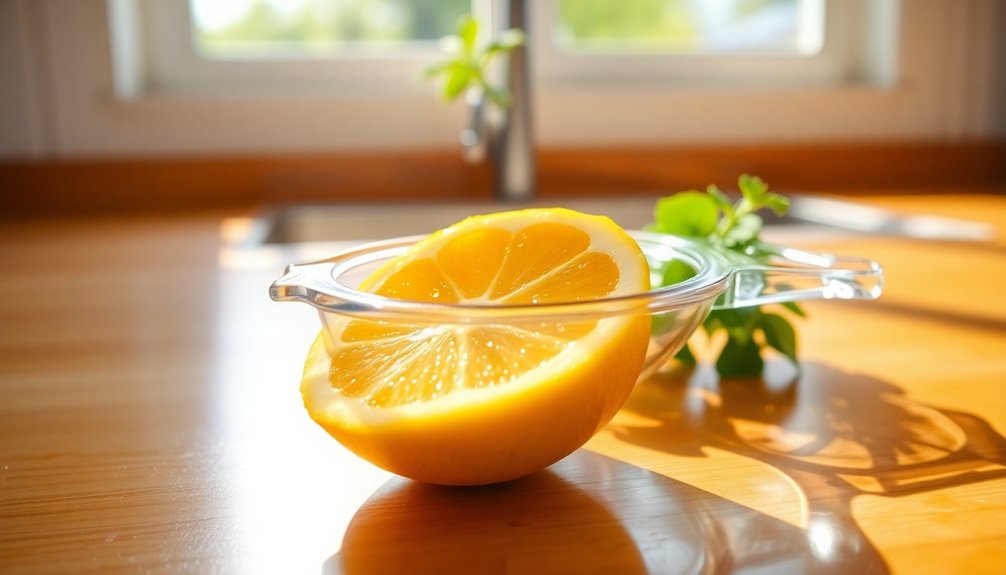A medium lemon gives you about 2 to 3 tablespoons of juice, which is handy for all sorts of recipes. If you're using larger lemons, you might squeeze out up to 4 tablespoons or even a quarter cup. Keep in mind that ripeness and freshness play a big role in juice yield. If you want to maximize how much juice you get, there are some great techniques to try. You'll discover more tips on getting the most out of your lemons!
Key Takeaways
- A medium lemon yields approximately 2 to 3 tablespoons of juice.
- Larger lemons can provide up to 4 tablespoons or a quarter cup of juice.
- Half a medium lemon typically produces around 1.5 tablespoons of juice.
- For ½ cup of juice, about 3 medium lemons are needed.
- Fresh, ripe lemons yield more juice than overripe or under-ripened ones.

When you squeeze the juice from one medium lemon, you can expect to get about 2 to 3 tablespoons of bright, tangy liquid. This amount is perfect for adding a burst of flavor to your dishes or drinks. If you’re working with a larger lemon, you might be pleasantly surprised, as it can yield up to 4 tablespoons, or even a quarter cup, of juice. The size of the lemon plays a significant role in how much juice you can extract, and knowing this can help you plan your recipes better. Additionally, the freshness of the lemon can impact the juice yield from a single lemon, as older lemons may have dried out and produce less liquid. To maximize your juice yield, roll the lemon on a countertop before slicing it open; this helps to break down the membranes inside, allowing more juice to flow out. Remember, understanding the typical juice yield from a single lemon can elevate your cooking and cocktail-making game, ensuring you achieve the perfect balance of acidity and zest.
One important thing to keep in mind is that the ripeness of the lemon also affects the amount of juice it yields. A fresh lemon is typically juicier than one that's overripe or under-ripened. Therefore, when you're selecting lemons, look for ones that feel firm yet slightly soft to the touch, indicating they're ripe and ready to release their juice. Seasonal variations can further influence the juice yield, so it's always a good idea to check the quality of the lemons before you commit to a recipe.
If you need to measure out specific amounts, knowing that half a medium lemon generally produces around 1.5 tablespoons of juice can be helpful. This way, you can easily adjust your quantities based on what you need. For larger recipes, if you're aiming for about ½ cup of juice, you'll need approximately 3 medium lemons. If your recipe calls for a full cup of lemon juice, you'll want to gather around 6 medium lemons. Having an extra lemon on hand is always a good idea, just in case you need a little more juice than you anticipated.
To maximize the juice extraction from your lemon, there are a couple of tricks you can employ. First, roll the lemon on a hard surface before cutting it. This action helps break down some of the internal membranes, making it easier to squeeze out more juice. Additionally, warming the lemon slightly in the microwave for about 10-15 seconds can help soften it, allowing for an even better yield.
When you're working with this citrus fruit, also remember that the juice of one lemon can transform your dishes, from marinades to desserts. The bright acidity and fresh flavor can enhance everything, so don't hesitate to incorporate it into your cooking.
Understanding how much juice you can get from one medium lemon not only helps you in the kitchen but also ensures you can create flavorful and balanced dishes every time. So, the next time you reach for that lemon, know exactly what to expect in terms of juice yield, and enjoy the delightful flavor it brings to your culinary creations.
Frequently Asked Questions
How Much of Bottled Lemon Juice Is Equal to 1 Lemon?
When you're substituting bottled lemon juice for a fresh lemon, start with about 2 tablespoons. This amount usually matches the juice from a medium lemon.
Keep in mind that bottled juice can be more concentrated, so it's smart to taste your dish as you go. If you find it too strong or not acidic enough, adjust the quantity to suit your flavor preference.
Fresh juice is always best, but bottled is convenient!
Can You Substitute Bottled Lemon Juice for Fresh Lemon Juice?
Like a painter choosing colors, you can substitute bottled lemon juice for fresh lemon juice, but the results may vary.
Bottled juice often lacks the vibrant flavor that fresh juice delivers, so you might need to adjust the quantity to achieve the desired taste.
For dishes where freshness shines, like salads, fresh juice is best.
In cooked recipes, bottled juice can work, but always taste and tweak as needed for balance.
Is Realemon the Same as Lemon Juice?
No, Realemon isn't exactly the same as fresh lemon juice.
While it's a convenient alternative, Realemon is made from concentrated lemon juice and often contains preservatives, which can alter its flavor.
When you use Realemon, you might notice it lacks the bright, vibrant taste of fresh juice.
If you're after that freshness in your dishes, you may want to squeeze a real lemon instead for a more authentic flavor.
How Much Juice Is in Two Lemons?
When you squeeze two medium lemons, you typically get about 6 tablespoons of juice.
If you're using large lemons, you can expect around ½ cup of juice from just two.
Smaller lemons yield less, giving you about 4 tablespoons in total.
Keep in mind that factors like size and ripeness can affect the amount, so it's a good idea to have an extra lemon on hand just in case you need more.
Conclusion
So, next time you're squeezing a lemon, remember that the juice of one lemon typically yields about 2 to 3 tablespoons. You might think that's not much, but every drop packs a punch of flavor and nutrition. It's not just about quantity; it's about the impact those few tablespoons can have on your dish or drink. Don't underestimate the power of simplicity—sometimes, the smallest ingredients make the biggest difference in elevating your culinary creations.
Cindy thoroughly researches juicing trends, techniques, and recipes to provide readers with practical advice and inspiration. Her writing style is accessible, engaging, and designed to make complex concepts easy to understand. Cindy’s dedication to promoting the advantages of juicing shines through her work, empowering readers to make positive changes in their lives through the simple act of juicing.
















